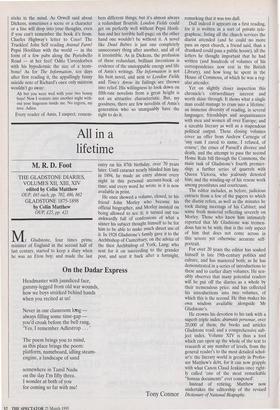All in a lifetime
M. R. D. Foot
THE GLADSTONE DIARIES, VOLUMES XII, XIII, XIV edited by Colin Matthew OUP, £65 each, pp. 702, 486, 862 GLADSTONE 1875-1898 by Colin Matthew OUP, £25, pp. 421 Mr Gladstone, four times prime minister of England in the second half of last century, started to keep a diary when he was an Eton boy; and made the last entry on his 87th birthday, over 70 years later. Until cataract nearly blinded him late in 1894, he made an entry almost every night in this personal account-book of time; and every word he wrote in it is now available in print. He once showed a volume, closed, to his friend John Morley who became his official biographer, and Morley insisted on being allowed to see it; it turned out too awkwardly full of confessions of what a sinner his subject thought himself to be for him to be able to make much direct use of it. In 1928 Gladstone's family gave it to the Archbishop of Canterbury, on the advice of the then Archbishop of York, Lang; who sent for it on succeeding to the grander post, and sent it back after a fortnight, remarking that it was too dull.
Dull indeed it appears on a first reading, for it is written in a sort of private tele- graphese, listing all the church services the diarist attended (and he could no more pass an open church, a friend said, than a drunkard could pass a public house), all the letters he thought important that he had written (and hundreds of volumes of his correspondence now rest in the British Library), and how long he spent in the House of Commons, of which he was a reg- ular attender.
Yet on slightly closer inspection this chronicle's extraordinary interest and worth shine through. It shows what a single man could manage to cram into a lifetime: an immense diversity of reading, in several languages; friendships and acquaintances with men and women all over Europe; and a sizeable literary as well as a stupendous political output. These closing volumes cover an offer from Andrew Carnegie of `any sum I cared to name, I refused, of course'; the crises of Parnell's divorce and death, and the attempt to pass the second Home Rule bill through the Commons, the main task of Gladstone's fourth premier- ship; a further series of quarrels with Queen Victoria, who jealously detested him; and the winding-up of his rescue work among prostitutes and courtesans.
The editor includes, as before, judicious extracts from a few of the papers to which the diarist refers, as well as the minutes he took during meetings of his Cabinet; and some fresh material reflecting severely on Morley. Those who knew him intimately reported that Mr Gladstone was tremen- dous fun to be with; that is the only aspect of him that does not come across in this severe yet otherwise accurate self- portrait.
For over 20 years the editor has soaked himself in late 19th-century politics and culture, and has mastered both; as he has demonstrated in a series of introductions to these and to earlier diary volumes. He sen- sibly observes that many potential readers will be put off the diaries as a whole by their tremendous price; and has collected his introductions into two volumes, of which this is the second. He thus makes his own wisdom available alongside Mr Gladstone's.
He crowns his devotion to his task with a superb triple index: dramatis personae, over 20,000 of them; the books and articles Gladstone read; and a comprehensive sub- ject index. Volume XIV is thus a tool which can open up the whole of the text to research at any number of levels, from the general reader's to the most detailed schol- ar's: the literary world is greatly in Profes- sor Matthew's debt, for it can now grapple with what Canon Claud Jenkins once right- ly called 'one of the most remarkable "human documents" ever composed'.
Instead of retiring, Matthew now undertakes the editorship of the revised Dictionary of National Biography.


























































 Previous page
Previous page